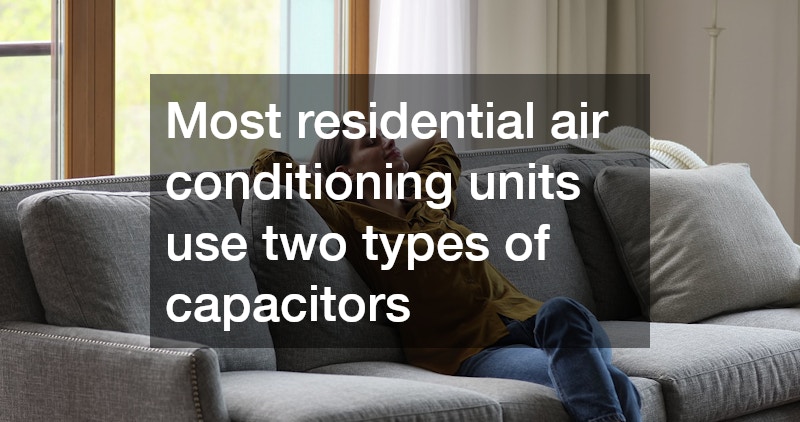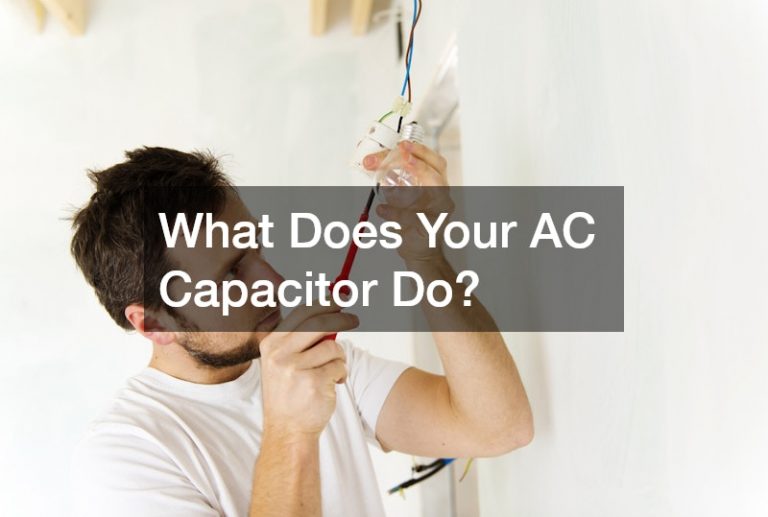The air conditioning system in your home is a complex machine comprising several critical components, one of which is the AC capacitor. An AC capacitor is a device that stores electrical energy, functioning much like a battery, though its primary purpose is to provide the necessary jolts for starting and maintaining the operation of the AC unit. Capacitors are crucial in supplying the additional power required to start the system’s motor, ensuring that your AC runs effectively and efficiently. Without a properly functioning capacitor, your air conditioning unit may struggle to operate or might not even start at all. Hence, understanding the role of the AC capacitor helps in recognizing why your unit may need AC repair and how vital it is for everyday comfort.
Most residential air conditioning units use two types of capacitors: start capacitors and run capacitors. A start capacitor provides a significant energy boost to get the system running, while the run capacitor maintains a consistent flow of energy to keep the system operating smoothly.
Both types of capacitors play essential roles in the functionality of the AC, but they also degrade over time. This degradation can lead to AC failures, which might require professional AC repair to address. Recognizing the symptoms of capacitor failure can thus save time and prevent further damage to the unit.
Many homeowners may not realize the importance of keeping their AC capacitors in good condition until they experience problems. Regular maintenance and timely AC repair can prevent such issues, ensuring your system functions at its best. When a capacitor begins to fail, it can cause a variety of problems, including the air conditioner failing to start, frequent cycling, or a loss of cooling efficiency. Often, these symptoms are mistaken for other issues, such as refrigerant leaks, but they can be traced back to the capacitor. Therefore, having a basic familiarity with your AC’s components can be incredibly beneficial.
How AC Capacitors Affect Performance
The performance of your air conditioning system largely hinges on the condition of its capacitor. When your AC functions correctly, much of this is due to capacitors providing the energy needed to power various motors within your system. The blower motor, compressor motor, and fan motor all rely on the capacitor’s stored energy; without it, these parts would not have the initial boost necessary to start and continue operating. If a capacitor is weak or failing, the performance of these motors is directly impacted, often leading to reduced cooling efficiency or complete system failure. As a result, preserving your AC capacitors through regular checks and maintenance is crucial to maintaining the overall performance of your air conditioning system.
Another key factor in how capacitors affect system performance is the electrical efficiency of the unit. A properly functioning capacitor assists not just in powering the motors but also in balancing the power supply in the system, which optimizes energy consumption. A failing capacitor increases the electrical resistance, forcing the motors to work harder and consume more energy, which leads to higher electricity bills and undue stress on the entire system. Frequent power issues or tripping fuses can often point to capacitor deterioration, indicating the need for immediate AC repair to avoid further complications.
Regular inspection and maintenance of capacitors are fundamental in preemptive AC repair strategies. Technicians who conduct these maintenance checks can identify early signs of capacitor failure, ensuring that potential problems are addressed before they lead to extensive and costly repairs. It’s important to note that capacitors can fail without warning, making routine examinations even more significant. By keeping a close watch on the performance of your AC and being proactive in maintenance, you can ensure longer-lasting, efficient cooling performance throughout the hottest months of the year.
Signs That Your AC Capacitor Needs Repair
Identifying early signs that your AC capacitor needs attention can prevent significant problems down the line. The most common indicator of a failing capacitor is the air conditioner failing to kick on or taking longer than usual to start. You might also notice that the system frequently cycles on and off without actually cooling the space as expected. Such scenarios suggest the capacitor cannot hold enough charge to keep the motors continually running. If you meet these symptoms, it might be time to consider an AC repair to avoid complete system breakdown during peak usage.
Additionally, physical signs on the capacitor itself can be indicative of its health. A failing capacitor may exhibit bulging or leaking, signs that it can no longer store the electrical energy required. Hearing unusual noises from the AC unit, such as humming or clicking, can also indicate capacitor issues since these are typical sounds created when it’s struggling to power the motors. If these signs are ignored, there’s a potential risk of damaging other components of the air conditioner, which are more costly to repair or replace. Thus, recognizing these indicators and opting for preemptive measures through AC repair can extend the lifespan of your unit.
Homeowners should be encouraged to periodically check for these symptoms, or better yet, schedule regular professional maintenance with a trusted AC repair service. Such practices help in catching and resolving minor capacitor issues before they escalate. Capacitors typically have a limited lifespan, generally around 10 to 15 years, depending on their use and environmental conditions. They may fail sooner, especially in regions with heavy air conditioning usage or extreme temperature swings. Thus, by staying vigilant and collaborating with professional services, you ensure your AC system remains reliable and efficient without unexpected downtime.

